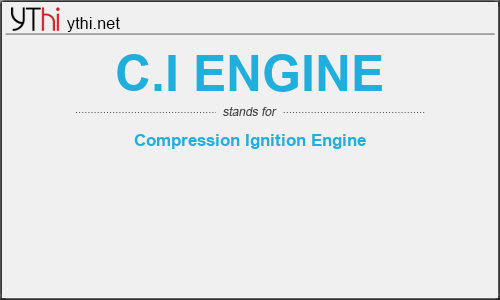What does C.I ENGINE mean? What is the full form of C.I ENGINE?
The full form of C.I ENGINE is Compression Ignition Engine
The compression ignition engine or diesel engine is the type that has most commonly been used for power generation, particularly in off-grid situations. The engine uses a higher compression ratio than a spark ignition engine to heat air in the engine cylinder. Fuel, normally diesel which is more dense than gasoline, is then introduced and ignites spontaneously. The high compression ratio leads to higher efficiency but diesel engines must be stronger, and therefore heavier to contain the higher pressure. This makes them more expensive. The engines also produce greater quantities of some emissions than spark ignition engines. Some engines increase efficiency further by using turbochargers or superchargers. Most diesel engines are four stroke but some very large, slow-speed diesel engines are based on a two-stroke cycle.
The history, present and future of the compression ignition engine, is a fascinating story that spans over 100 years, from the time of Rudolf Diesel to the highly regulated and computerized engines of the twenty-first century. The development of these engines provided inexpensive, reliable, and high-power density machines to allow transportation, construction, and farming to be more productive with less human effort than in any previous period of human history. The concept that fuels could be consumed efficiently and effectively with only the ignition of pressurized and heated air was a significant departure from the previous coal-burning architecture of 1800s. Today, the compression ignition engine is undergoing yet another revolution. The equipment that provides transport, build roads and infrastructure, and harvests the food we eat needs to meet more stringent requirements than ever before. How successfully twenty-first century engineers are able to make compression ignition engine technology meet these demands will be of major influence in assisting developing nations (with over 50% of the world’s population) achieve the economic and environmental goals they seek.
C.I ENGINE
means
Compression Ignition Engine![]()
Translate Compression Ignition Engine to other language.


Leave a Reply
You must be logged in to post a comment.